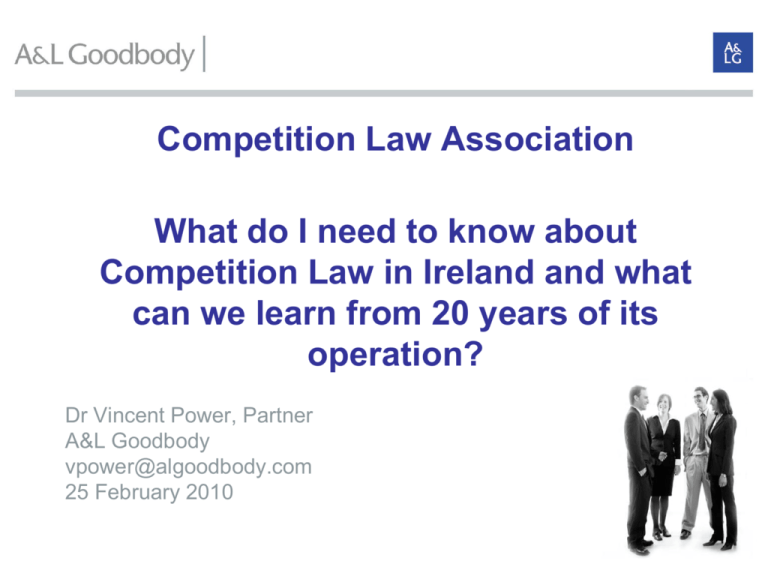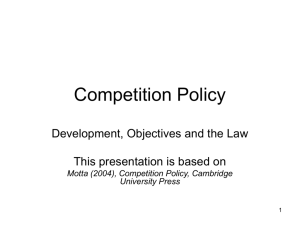to view slides - Competition Law Association
advertisement

Competition Law Association What do I need to know about Competition Law in Ireland and what can we learn from 20 years of its operation? Dr Vincent Power, Partner A&L Goodbody vpower@algoodbody.com 25 February 2010 Outline of the Presentation 1. Task is to brief you on competition law in Ireland 2. An overview of competition law and practice Irish regime » Anti-competitive practices » Mergers and acquisitions » Case law » 3. What have been the interesting cases and lessons from the two decades? 2 Why Ireland? Ireland has been connected with some interesting competition cases… United Brands Magill HB/Mars Holyhead I and II as well as Roscoff Charleroi Ryanair/Aer Lingus Irish Beef Some pending State Aid decisions in the financial services sector 33 convictions, first jury conviction in Europe for cartels, first jail sentences and some interesting civil cases 3 Introduction Ireland, like England & Wales, is a common law jurisdiction in the EU Traditional approach to competition law issues but changes in the late 1980s/early 1990s First Regime: Competition Act 1991 and Competition (Amendment) Act 1996 Second Regime: Competition Act 2002 and Competition (Amendment) Act 2006 Other legislation already in place and new legislation on the way Mixture of successes and failures Ireland is a little different! 4 Introduction Competition Act 1991 » Establishment of the Competition Authority » Privatisation of Enforcement: Private Actions » Competition Authority was not given the power to impose fines but could take civil cases (but no dawn raid powers) » Competition law breaches were civil but not criminal wrongs » Merger control was still a Ministerial decision but mergers could be supervised under the Mergers Acts and the Competition Act » Notification regime for arrangements 5 Introduction Competition (Amendment) Act 1996 » Public Enforcement of Competition Law » Criminalisation of Breaches » Competition Authority still not given the power to dawn raid and impose fines » Prosecutions had to be taken in court » Evidential and enforcement difficulties 6 Introduction Competition Act 2002 » The 1991-1996 Acts were not working » Abolition of notifications – “washing clean linen in public” » Criminalisation of breaches of EU competition law » Before the 2002 Act, merger control was still a Ministerial decision but mergers could be supervised under the Mergers Acts and the Competition Acts (risk of divergence) » Evidential presumptions put in place Competition (Amendment) Act 2006 » Grocery sector 7 Irish Regime Competition Authority » Focused entirely on competition law » Does not have the power to impose fines – so extra rigour required » » » » for court cases to succeed (not just review of decisions) Anti-competitive arrangements Abuse of dominance Concentration control Studies and advocacy Courts » » » » Extremely important Economists Juries No CAT 8 Irish Regime Anti-Competitive Arrangements » Civil breaches » Criminal breaches » A breach of Art.101 TFEU is a criminal offence under Irish law » Imprisonment for up to five years and/or fines of €4m/10% of worldwide turnover » Focus on cartels Abuse of Dominance » Civil and criminal breach » A breach of Art.102 TFEU is a criminal offence under Irish law » Difference in penalties 9 Concentration Control Concentration Control » Competition Authority is centre-stage with Ministerial involvement limited to media mergers and emergency financial mergers » “Substantial lessening of competition” test » Notification and publication regime » Some interesting cases 10 Concentration Control Concentration » two or more previously independent undertakings merge; or » one or more undertakings, who or which control one or more undertakings, acquire direct or indirect control of the whole or part of one or more other undertakings; » the result of an acquisition by one undertaking (the first undertaking) of the assets (including goodwill) (or a substantial part of the assets) of another undertaking (the second undertaking) is to place the first undertaking in a position to replace (or substantially replace) the second undertaking in the business or, as appropriate, the part concerned of the business in which that undertaking was engaged immediately before the acquisition; » a full function joint venture is formed (i.e., one which performs, on an indefinite basis, all the functions of an autonomous economic entity) 11 Concentration Control Notifiable if: The worldwide turnover of each of at least two of the undertakings involved in the transaction is not less than €40 million; and Each of at least two of the undertakings involved in the transaction carries on business in any part of the island of Ireland (i.e., the Republic and Northern Ireland); and The turnover in the Republic of any one of the undertakings involved is not less than €40m or it is a media merger (Voluntary filing regime possible for other transactions) 12 Concentration Control “Carries on Business” is a critical concept Non-binding notice published by the Authority in 2006 defines “carries on business” as meaning that the undertakings have either: » Have a physical presence on the island of Ireland and make sales or supply services to customers in the island of Ireland; or » Without having a physical presence on the island, have made sales into the island of Ireland of at least €2 million in the most recent financial year 13 Concentration Control Media Mergers Since 1 May 2007, a “media merger” is a merger or acquisition in which either: (1) two or more of the undertakings involved carry on a defined media business in the State; or (2) one or more of the undertakings involved carries on a media business in the State and one or more of the undertakings involved carries on a media business elsewhere A media business is defined as: (1) publication of newspapers or periodicals consisting substantially of news or periodicals consisting substantially of news or current affairs; (2) sound and/or audio broadcasting (except over the internet); or (3) the provision of a broadcasting services platform Thresholds do not apply – media mergers are automatically notifiable Cumbersome procedure in theory but works in practice However, what if a Group (which happens to include a media business) buys something which is clearly not media-related? 14 Concentration Control Financial Mergers The pre-existing regime and the Credit Institutions (Financial Support) Act 2008 regime both operate Section 7 of the 2008 Act has a special regime Maintenance of the stability of the financial system v. competition law? 2008 Act transactions are notifiable to the Minister rather than the Competition Authority Clearance of an otherwise anti-competitive deal is possible where it is necessary to maintain the stability of the financial system in the State, to avoid a serious threat to the stability of credit institutions and to remedy a serious disturbance in the economy of the State 15 Concentration Control Notification Process under the Competition Act Notification within one month of concluding the agreement or the making of the public bid – can that be circumvented? The “one month” is calculated by including the date after which the month commences so the month expires on the day before the corresponding date the following month Failure to notify has consequences 16 Concentration Control €8,000 filing fee Calendar days not working day timetable First Phase procedure: typically, one month but can be 45 days with proposals from the parties Second Phase procedure: can be longer – up to four months normally with conditions imposable by the Authority Vast majority of cases are first phase decisions Opening a second phase is not necessarily a problem 17 Concentration Control Clearance is a precondition to closing concentrations Clearance without approval in Ireland Aviva/CGU/Gresham Radio 2000/Newstalk 106 Topaz/Statoil Third party involvement 18 Concentration Control Three deals blocked: » IBM/Schlumberger (high market share) » Kingspan/Xtratherm (competitor evidence) » Kerry Foods/Breeo (no credible alternative constraining brands) One appeal, successful at High Court level but now on appeal to the Supreme Court (Kerry Foods/Breeo) Britvic/C&C Heineken/Beamish & Crawford Johnston Press/Clonnad 19 Criminal Enforcement Criminal Enforcement » To date, 33 convictions » How? Leniency and transparency of some trade association activities » Are juries willing to convict? » What are the guidelines on sentencing? » What are the lessons? › Little guys › Procedures › Leniency › Cartels 20 Some Interesting Cases For example: West of Ireland Home Heating Cases Competition Authority v Duffy Law Society v Competition Authority Mayo Waste Panda Irish Beef Competition Authority v LVA and VFI 21 Some Interesting Cases Law Society v Competition Authority » Legal representation of suspects in cartel investigation » Competition Authority stated that it could veto the choice of lawyer where several suspects chose the same lawyer » Law Society was concerned from a general policy perspective » Forced to institute proceedings in the High Court » High Court annulled the Competition Authority’s “notice” 22 Some Interesting Cases Irish Beef » “Rationalisation” » Government involvement and McKinsey Report » “Stayers” and “Goers” with compensation » Competition Authority » High Court not concerned under Article 101(1) » Supreme Court appeal by the Authority » Article 267 reference to the CJEU » Supreme Court decision and reference back to the High Court » High Court to consider application of Article 101(3) » European Commission intervention 23 Some Interesting Cases Mayo Waste » Controversial case » Jury » Decision-making by the jury » “Theory of harm” issue » Farmers’ blockade of Drogheda port case » Concerns by the Competition Authority 24 Some Interesting Cases Competition Authority v LVA and VFI » Recession and declining on-trade drink sales » Two vintners’ associations announce a “price freeze” » Competition Authority reacts with concern » Associations refuse to withdraw it » But associations had some years earlier given undertakings not to do anything with pricing » Competition Authority invoked those undertakings and sued the associations » Court found the associations were in breach of those commitments 25 Some Interesting Cases Panda » Application of Competition Acts to the Local Authorities » Decision by the High Court Competition Authority v Avonmore Waterford Group/Athboy Cooperative Ballina Mineral Water v Heineken Irish Dental Association Civil damages actions » Donovan v ESB Follow-on actions 26 Differences Key Differences in the Irish System » Different law and legal regime » Strong written Constitutional protection of human rights » Competition Authority deals only with competition (not consumer » » » » » matters) but this is scheduled to change Historically, strong international team in the Authority but constant change Competition Authority does not have power to impose fines – the court is where the real enforcement lays A strong but intermittent US dimension to Irish competition law High market shares are not an issue Hold separate/fix-first arrangements are unusual 27 Lessons Do not rely on the private enforcement of competition law Streamline merger control Abolition of notifications but community still needs guidance Merger of the Competition Authority and Consumer Body? Competition enforcement by lower courts is not easy Competition enforcement by some juries may not be easy High market shares not necessarily a problem in concentration control 28 Lessons Be careful of open-ended and wide studies Valuable international experience and expertise But “chopping and changing” of personnel Trade associations Authority is subject to the vagaries of political “respect” Cartel enforcement has been against the “little guys” BIDS and the State element Public understanding and acceptance or is “competition” something you can have in a boom but not in a bust? 29 Competition Law Association What do I need to know about Competition Law in Ireland and what can we learn from 20 years of its operation? Dr Vincent Power, Partner A&L Goodbody vpower@algoodbody.com 25 February 2010








